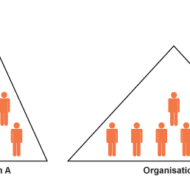Posted by Managementguru in Business Management, Organisational behaviour, Principles of Management
on Mar 6th, 2014 | 0 comments

Corporate Philosophy of Management CORPORATE PHILOSOPHY OF MANAGEMENT calls for creating a framework of values, beliefs and ethical standards which are considered to be vital for an effective management. They must be embedded in formal and informal philosophical statements which are then communicated to the fraternity of that organization. From a broader perspective, the LEADER has to have a VISION as to where he is heading his company in the next three to four years. Corporate Objectives provide vision as well as direction and map for bold decisions to be taken regarding NEW MARKETS MARKET SHARE PRODUCTS SERVICES etc. , Now the organization is in a position to decide and prioritise the VALUES AND COMPETENCIES it expects from its managers. For example, if the situation favors the business expansion to new markets, say, European or Asian, then an organization has to develop competence in areas like LANGUAGE AND CULTURE, besides marketing and business skills. Different Philosophies of Management: Well, you might have been inspired with JAPANESE PHILOSOPHY OF MANAGEMENT, EASTERN OR WESTERN PHILOSOPHY OF MANAGEMENT t. But what is the fun? If you don’t have A SOUND MANAGEMENT PHILOSOPHY of your own, to simply put it, you don’t have a broad set of principles to back up your management development process which is a generic one. Ideally speaking, you should be able to develop a concrete SYSTEM that is made up of FOOL PROOF policies and procedures; try to develop a professional team of executives who can take up your vision to the next level; these measures will prove worthwhile in the long run. You are left without any choice but to develop “truly” INTERNATIONAL MANAGERS who could transcend nationally and the location of any specific job consideration. This is what Ideal management philosophy means to me, A holistic vision of the future A solid set of principles(values, beliefs) Sound policy definition Management development programmes Autonomy to my work force Always “yes “to new technology Development of women managers Flexible leadership Social responsibility Contribution to the growth of my Country’s economy Strategic Perspective: Major environmental shifts now demand a more strategic perspective from those who manage and lead in organizations; “GLOBALISING” in the quest for major market share brings in new opportunities for growth and prosperity. Organizations are now espousing values that regard people, not as costs to be minimized, but AS “ASSETS TO BE MAINTAINED AND DEVELOPED.” An open systems approach of management is likely to overcome many of the problems created by the piecemeal approach. Instead of looking at management development in isolation, see it as an integral part of a wider organizational system that takes care of the processes through which people working for the firm take care of themselves leading to self...

Posted by Managementguru in Entrepreneurship, Project Management
on Mar 6th, 2014 | 0 comments

How can we define Business? Business is an important institution in the society. Be it for the supply of goods and services; Creation of employment opportunities; Offering better quality of life; Contribution to the economic growth of a country; the role of business is crucial. The subject of business is as interesting as its role in society. The more one reads about it, more interesting does business become. To be successful, you have to have your heart in your business, and your business in your heart. – Thomas Watson Sr. Entrepreneurial activities The increasing number of business schools and institutions signify the importance and the need for training the students on rudiments of business management. Developing countries encourage entrepreneurial activities and view it as a strategy to improve the GDP (Gross Domestic Product). More business activity means increased per capita income and increased standard of living. A business must make profit to succeed. Profit is income minus outgo. It is the main incentive for starting a business. Business people weigh each of their decisions in terms of making profit and avoiding loss. In a corporate environment, business has to aim for wealth maximization apart from profit maximization to increase the shareholder’s wealth in the long run. The scope of business is indeed vast. It all depends on how well you have analyzed and understood the nuances of your business activity, in order to survive and sustain in the market. Supply Chain The supply chain in a business activity involves numerous links in the form of manufacturers, supplier of raw materials to the manufacturer, dealers, logistics, intermediaries, consumers, bankers, advertising agencies, insurance agencies and so on. All these elements have to function in a coordinated manner for the benefit of the consumer. Now days, business has become customer-centric rather than product-centric. This serves both the purpose of product development in lieu of customer needs and customer satisfaction. The multitudinous activities involved in bringing raw materials to the factory and the end product from there to the market constitute business. In addition, a business activity has to comply with legal restrictions and government regulations. A business is also expected to discharge its social obligations to consumers, employees, owners and to other interest groups, which have stakes in business directly or indirectly. Planning and organization Planning and organization are two key principles in running a business enterprise as planning sets up a concrete premise on which action plans can be developed and organized activities assures definite success. Modern business is dynamic. Future business will be knowledge based and brainpower will be in greater demand. Organizations have become flat. Eight to twelve organizational layers have been reduced to two or three. Gone are the days of sheltered markets, subsidies, licenses, quotas and restrictions. Businesspersons are asked to stand on their feet, to eliminate inefficiencies, cut down costs and improve productivity. LoL! It might be said that it is the ideal of the employer to have production without employees and the ideal of the employee is to have income without work. –E. F....

Posted by Managementguru in Business Management, Organisational behaviour, Principles of Management
on Mar 3rd, 2014 | 0 comments

Levels of Organization An organization is a network consisting of people interacting to accomplish the enterprise objectives. The inter relationship is always complex as groups tend to develop conflicts and difference of opinion among themselves and in between. Hence the structure of an organization should be designed to clarify who is to do what task and who is responsible for what results and to furnish decision-making devoid of uncertainty. Organization implies to Recognizing and classifying the required activities Grouping of activities in order to achieve the objectives Appointing a manager and assigning him with the necessary authority to lead each group The provision for co-ordination vertically and horizontally “Organization is the establishment of authority and relationships with provision for coordination between them, both vertically and horizontally in the enterprise structure,” According to Koontz. FORMAL ORGANISATION It implies a formalized intentional structure of roles or positions. Formal organization must be flexible. The formal structure is laid down by the top management The levels are designed on the basis of specialization Purely task oriented and not people oriented Rules are very stringent and everyone is expected to follow them without fail INFORMAL ORGANISATION A network of personal and social relations arising spontaneously as people associate with one another and not restricted by the formal rules or structure. One important aspect of organizing is the establishment of department. Department designates a distinct area, division, or branch of an organization over which a manager has authority for the performance of specified activities. Spontaneous in nature More people oriented Based on religion, culture, common problems faced by the workforce etc., Membership is voluntary and the same person can be a member of many groups. ORGANISATION LEVELS AND SPAN OF MANAGEMENT Why there is a need to organize? To co-ordinate the activities of the people involved in the organization’s functions for which there needs to be certain levels established to facilitate the co-operation effective. There are two types of spans, 1. Wide span 2. Narrow span Pic Courtesy: LumenLearning WIDE SPAN: Wide span of management has fewer organizational levels with more number of sub-ordinates reporting to a superior. Though it proves advantageous for the superior as delegation becomes part of the process and hence work is shared, care must be taken in selecting the right people for completion of tasks and clear policies must be made to avoid confusion. There is this tendency of overloaded superiors to become decision bottlenecks and there exists the danger of superior’s loss of control too. This kind of management needs exceptionally qualified managers to lead the respective groups. NARROW SPAN: Narrow span of management involves many organizational levels with fewer number of employees reporting to a superior. This facilitates close supervision, close control and fast communication between superiors and subordinates. On the contrary, superiors tend to get too involved in subordinates’ work and this kind of management incurs higher costs due to many levels in the organization and there is excessive distance between the lowest and top most levels. FACTORS DETERMINING AN EFFECTIVE SPAN: 1. Training of Subordinates: Well trained subordinates save much time and energy of the superiors and training has to be a continuous process as the technological policies and procedures are subjected to change periodically. 2. Clarity of Delegation of Authority: Clarity implies direction and guidance from the manager’s end to the subordinate. A manager has the responsibility of clearly explaining the task and the methods involved to complete the task in a suitable manner to his subordinates. In cases of machine handling, “On the Job Training” becomes inevitable. If not, the work will not be completed as per the schedule due to lack of clarity. 3. Clarity of Plans: In a production environment, the workers have to be...

Posted by Managementguru in Economics, Entrepreneurship, Human Resource
on Mar 1st, 2014 | 0 comments

Entrepreneurship in Developing Economies Entrepreneurial development is a complex process of change. It has been recognized as an important ingredient of economic development. The development of entrepreneurial activity depends upon the closely interlinked economic, social, cultural, religious and psychological variables. Developing countries of late have adopted a deliberate policy of promoting and encouraging small enterprises as a strategy, for the overall development of their countries. Practical Problems Faced by Developing Countries The numerous problems confronted by developing countries such as, a high rate of population growth, a relatively low rate of economic growth, a low level of capital income with nearly fifty percent of the population subsisting below the poverty line and mounting increase in the figures of educated unemployed-all these check the growth of entrepreneurial activities. Countries have to plan realistically, mobilize and harness resources, have control over factors of growth and development and give direction to the development process. Naturally then, the national and economic goals will be focused towards: Production and productivity to be increased in the primary, secondary and tertiary sectors Maximum harnessing and utilization of material and human resources Solving problems of unemployment Having a check on population growth Equitable distribution of wealth and income To increase the purchasing power parity To increase the gross national product To increase the real per capita income Improving the quality of life Industrial Development The larger scope and potential to achieve these goals lie in the development of the industrial sector of the national economy, and the only alternative to raise the level of living is development of industries. Here, we are not merely concerned with certain quantum of growth and development in the industrial field. Theoretically, the desired quantum of industrial development could be supported by a few large investments and capital intensive units run by a small number of big entrepreneurs. But what is envisaged is to have the same quantum of industrial development with a wider spread consisting of large number of small entrepreneurs all over the country. This would result in development of small scale and tiny sector industries all over the country and would generate employment opportunities to the educated unemployed, skilled people and other potential entrepreneurs from various segments of the society. Scenario of Asian Countries Most of the Asian countries like India and China are encouraging and promoting entrepreneurial development leading to industrial and economic development. India is now a hot spot for automobiles and its accessories. Being a cost-effective core market for auto components sourcing for global auto makers, the automotive sector is a potential sector for entrepreneurs. Entrepreneurs are risk bearers, find resources and fill market gaps that would be missed by larger, more bureaucratic organizations. Entrepreneurs improve the social welfare of a country by harnessing dormant, previously overlooked talent. Surplus manpower which is considered a great liability can be converted into assets once those with potential are selectively groomed for self-employment and enterprise formation, leading to further job...

Posted by Managementguru in Entrepreneurship, Human Resource
on Mar 1st, 2014 | 0 comments

The Spirit of Entrepreneurship In the modern competitive business environment, not all graduates of various disciplines like engineering, management and the like can aspire for white collar jobs. The recent global recession has made the prospective job seekers think twice about working in foreign countries. Self employment has become the order of the day. Being your own boss is truly inspiring and motivating at least in theory. When it comes to reality, we need to know exactly what does it take to become an entrepreneur by starting a small business or taking over the business run by your predecessors. Why we need more entrepreneurs? Various avenues have been opened up thanks to communication and transportation that has brought the world under a single huge umbrella. Also small industries face minimum risk as the investments are marginal and they have the liberty to try a number of innovations like combination of new products new materials new methods of production new markets new sources of materials and even New forms of organization. Being a competitor in an open market, minimum profit and constant revenue inflow are assured and also they can enjoy the benefit of minimum fluctuation in the product price as it is determined by the market and not by individuals. Want to know 10 Daily Habits of Most Successful Entrepreneurs? Scope of entrepreneurial activity: Either you can be a subsidiary to large scale business or you can engage yourself in supply of repair services with small engineering establishments or you can go for small cottage industry businesses like cutlery, furniture, jewelry, fruit canning, soap making etc., Being fairly labor intensive, you can provide economic solution by creating employment and income opportunities in urban and rural areas with relatively low cost of capital investment. Business process outsourcing has been in recent times the magic happening in countries like India, China etc., where the foreign investors take advantage of cheap labor, time and efficient communication skills of the population. Knowledge process outsourcing has also become popular and it stands as a testimony of the rising power of Asian countries over the west. “Small is beautiful” and you can make it big in the small scale business industry if you are Innovative and productive Provide personalized services to the customers Identify and target the right markets This ensures “WINNING THE GAME OF BUSINESS“. An economy grows only when it has large number of enterprises accelerating the economic growth prospects of that particular country. The export policies of all nations have become more flexible owing to globalization, liberalization and...










